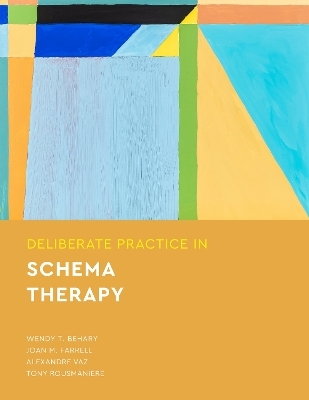
Deliberate Practice in Schema Therapy
American Psychological Association (Verlag)
978-1-4338-3602-2 (ISBN)
Each book in the Essentials of Deliberate Practice series contains customized role-playing exercises in which two trainees act as a client and a therapist, switching back and forth under a supervisor's guidance. The trainee playing the therapist improvises appropriate and authentic responses to client statements organized into three difficulty levels—beginner, intermediate, and advanced—reflecting common issues encountered by schema therapists.
The first 12 exercises focus on skills derived from schema therapy’s three stages—bonding and emotional regulation, mode change, and autonomy—and include limited reparenting, psychoeducation about schema modes, and empathic confrontation. Following these are two comprehensive exercises—an annotated transcript and free-form mock therapy sessions—in which trainees integrate essential skills into a single session.
Step-by-step instructions guide participants through the exercises, identify criteria for mastering each skill, and explain how to monitor and adjust difficulty. Guidelines to help trainers and trainees get the most out of training are also provided.
Wendy T. Behary, MSW, LCSW, is the founder and director of The Cognitive Therapy Center of New Jersey and The Schema Therapy Institutes of NJ-NYC-DC. She was also the President of the International Society of Schema Therapy (ISST) from 2010–2014. She is the author of Disarming the Narcissist: Surviving and Thriving with the Self-Absorbed (New Harbinger Publications). She has been treating narcissist clients, their partners and associates, and couples experiencing relationship problems; training professionals; and supervising psychotherapists for over 20 years. She lectures internationally to professional and general audiences on schema therapy and on narcissism and relationships. Joan M. Farrell, PhD, is a clinical psychologist and Adjunct Professor of Psychology and Research Director of the Center for Borderline Personality Disorder Treatment and Research at Indiana University-Purdue University Indianapolis. She directs the Schema Therapy Institute Midwest—Indianapolis. She has been training psychologists and psychotherapists internationally for 40 years. She developed a group model of schema therapy with Ida Shaw, and they wrote two books on this model for borderline and other personality disorders (Wiley Blackwell). Their latest book is Experiencing Schema Therapy From the Inside-Out: A Self-Practice/Self-Reflection Workbook for Therapists (Guilford Press). Visit https://www.schematherapy-training.com/. Alexandre Vaz, PhD, is director of training at the Sentio Marriage and Family Therapy graduate program and Sentio Counseling Center. He has authored many books on deliberate practice and psychotherapy training and is coeditor of the book series The Essentials of Deliberate Practice (APA Books). Dr. Vaz has held multiple committee roles for the Society for the Exploration of Psychotherapy Integration (SEPI) and the Society for Psychotherapy Research (SPR). He is founder and host of “Psychotherapy Expert Talks,” an acclaimed interview series with distinguished psychotherapists and researchers. Tony Rousmaniere, PsyD, is program director of the Sentio Marriage and Family Therapy graduate program, and executive director of the Sentio Counseling Center. He has authored many books on deliberate practice and psychotherapy training and is coeditor of the book series The Essentials of Deliberate Practice(APA Books). In 2017, Dr. Rousmaniere published the widely cited article in The Atlantic Monthly, “What Your Therapist Doesn’t Know.” Dr. Rousmaniere supports the open-data movement and publishes clinical outcome data at drtonyr.com. He is president of Division 29 of APA.
Series Preface
Tony Rousmaniere and Alexandre Vaz
Acknowledgments
Part I. Overview and Instructions
Chapter 1. Introduction and Overview of Deliberate Practice and Schema Therapy
Chapter 2. Instructions for the Schema Therapy Deliberate Practice Exercises
Part II. Deliberate Practice Exercises for Schema Therapy Skills
Exercises for Beginner Schema Therapy Skills
Exercise 1. Understanding and Attunement
Exercise 2. Supporting and Strengthening the Healthy Adult Mode
Exercise 3. Schema Education: Beginning to Understand Current Problems in Schema Therapy Terms
Exercise 4. Linking Unmet Needs, Schema, and Presenting Problem
Exercises for Intermediate Schema Therapy Skills
Exercise 5. Education About Maladaptive Schema Modes
Exercise 6. Recognizing the Mode Shifts of the Maladaptive Coping Modes
Exercise 7. Identifying the Presence of the Demanding/Punitive Inner Critic Mode
Exercise 8. Identifying the Presence of the Angry and Vulnerable Child Modes
Exercises for Advanced Schema Therapy Skills
Exercise 9. Limited Reparenting for the Angry and Vulnerable Child Modes
Exercise 10. Limited Reparenting for the Demanding/Punitive Inner Critic Mode
Exercise 11. Limited Reparenting for the Maladaptive Coping Modes: Empathic Confrontation
Exercise 12. Implementing Behavioral Pattern Breaking Through Homework Assignments
Comprehensive Exercises
Exercise 13. Annotated Schema Therapy Practice Session Transcript
Exercise 14. Mock Schema Therapy Sessions
Part III. Strategies for Enhancing the Deliberate Practice Exercises
Chapter 3. How to Get the Most Out of Deliberate Practice: Additional Guidance for Trainers and Trainees
Appendix A. Difficulty Assessments and Adjustments
Appendix B. Deliberate Practice Diary Form
Appendix C. Overview of Schema Therapy Concepts
Appendix D. Sample Schema Therapy Syllabus With Embedded Deliberate Practice Exercises
References
Index
About the Authors
| Erscheinungsdatum | 31.01.2023 |
|---|---|
| Reihe/Serie | Essentials of Deliberate Practice Series |
| Verlagsort | Washington DC |
| Sprache | englisch |
| Maße | 216 x 279 mm |
| Themenwelt | Geisteswissenschaften ► Psychologie ► Klinische Psychologie |
| Medizin / Pharmazie ► Medizinische Fachgebiete ► Psychiatrie / Psychotherapie | |
| Medizin / Pharmazie ► Physiotherapie / Ergotherapie ► Rehabilitation | |
| ISBN-10 | 1-4338-3602-5 / 1433836025 |
| ISBN-13 | 978-1-4338-3602-2 / 9781433836022 |
| Zustand | Neuware |
| Informationen gemäß Produktsicherheitsverordnung (GPSR) | |
| Haben Sie eine Frage zum Produkt? |
aus dem Bereich


